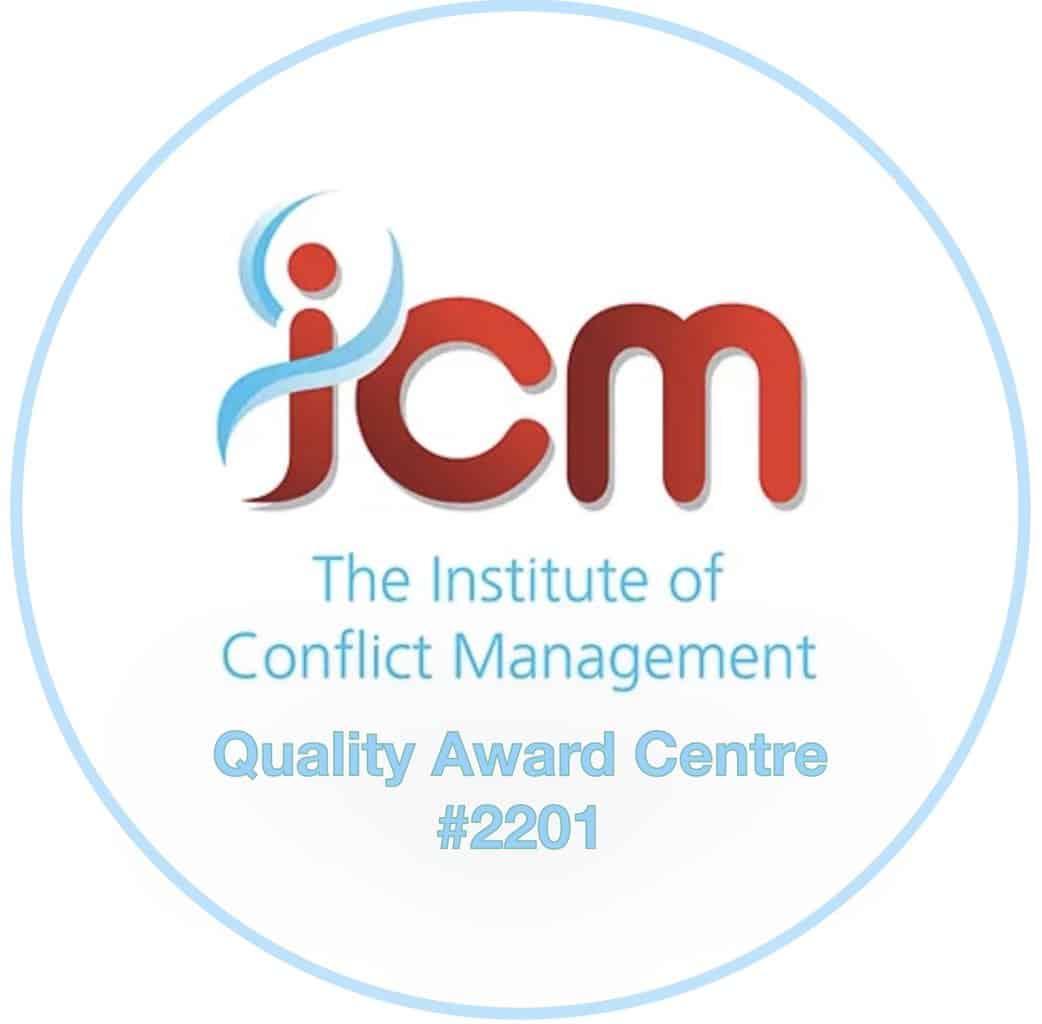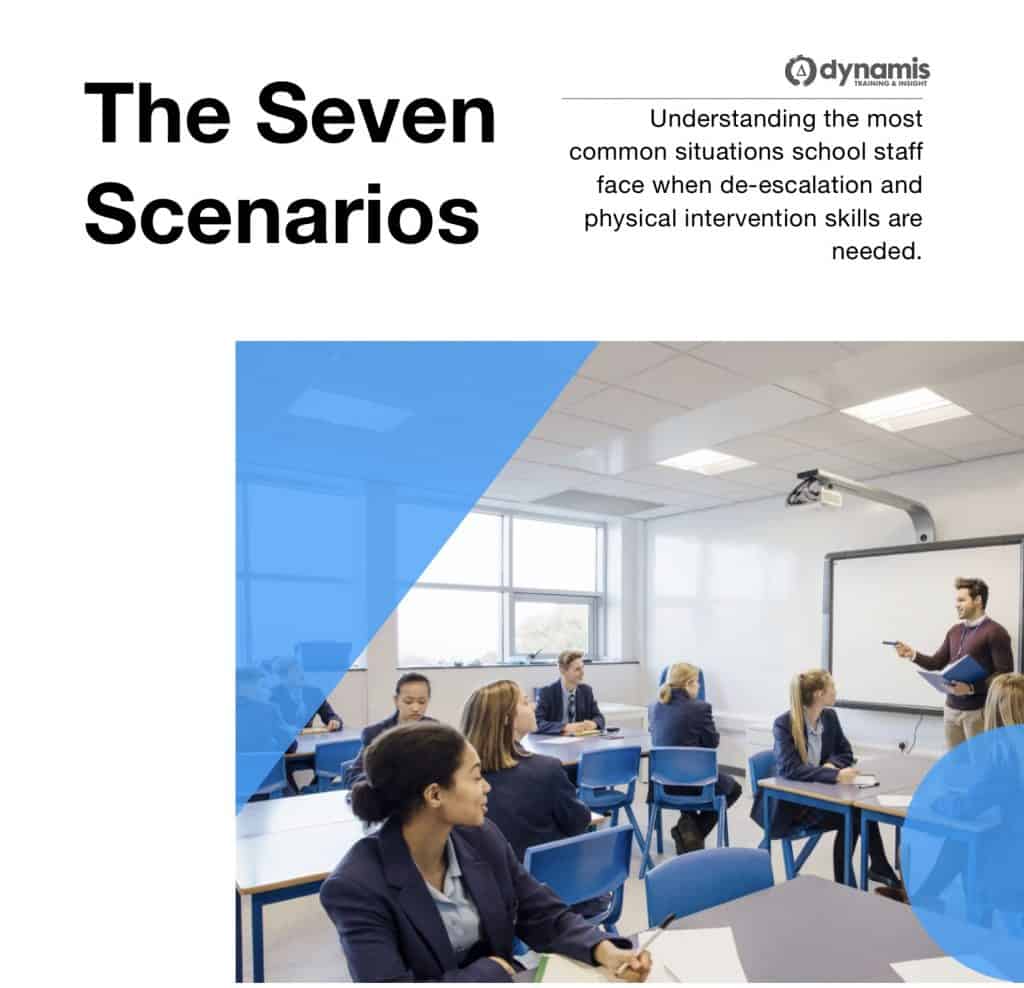Thank you for your enquiry!
Here are some Answers to Common Questions
Our ICM-accredited training for your team is popular with schools of all kinds because we match it to YOUR context and YOUR people. We tailor the design and delivery for each different school environment we work in - Early Years, Mainstream Primary, SEN contexts, High Schools, Alternative Provision environments and other Education settings all over the UK and Internationally.
We are a Quality Award Centre with the Institute of Conflict Management (QAC#2201) which provides independently-assessed evidence to clients of our high quality assurance standards through a rigorous assessment process.
We have a 5-Star endorsement from the SWC expert panel - 'Safety Without Compromise'.
The SWC ‘Safe l Caring l Secure’™ rating and endorsement scheme for training and safe practice in Violence, Aggression & Other Challenging Behaviours is the Gold Standard for assessing the work done by Organisations to look after their staff and patients’ safety, security and wellbeing.
It reviews the physical intervention, restrictive and coercive practices used by Organisations against new criteria, all assessed against a human rights, least restrictive, person-centred approach and demonstrating a commitment to minimising restrictive practices. It then provides a rating from 1 star to 5 stars with an endorsement at 4 and 5 star ratings.
Dynamis trainers are all full-time, qualified and insured professionals. Our team all hold Ofqual-recognised qualifications in Adult Education and Level 3 Advanced Award in Physical Restraint, offering you peace of mind that you are getting the best possible advice and training.
Here is a list of recognised accredited qualifications for Dynamis Director of Training, Gerard O’Dea.
All but the last have been awarded by OFQUAL-recognised awarding bodies and are therefore nationally recognised qualifications which are independently assessed:
- Certified Expert Witness (Criminal Cases) from Cardiff University Law School / Bond Solon
- Level 4 Award in Child Psychology
- BTEC Level 4 Professional Award in Preparing to Teach in the Lifelong Learning Sector (PTLLS)
- BTEC Level 4 Professional Award in Safer Handling of People (RoSPA)
- BTEC Level 3 Advanced Award in Delivery of Conflict Management Training
- BTEC Level 3 Advanced Award in Physical Restraint Practice
- BTEC Level 3 Advanced Award in Coaching & Instruction of Physical Restraint
- BTEC Level 3 Advanced Award in Advanced Self Defence Instruction
- BTEC Level 3 Advanced Award in Safe and Effective use of Restraint Devices
- Certified Instructor for Verbal Defence and Influence and European Adviser
Dynamis has been delivering this training since 2006 when we first started delivering courses for schools and teaching staff in the areas of de-escalation, personal safety and physical interventions. In the UK, this type of training in schools is called “Positive Handling” and we are now one of the most active training providers in the sector, known for our pragmatic, fresh and relevant approach.
To meet your scheduling, timing, resource, budget and staff constraints, we have evolved at least these five different ways your school can access Positive Handling from Dynamis.
Options:
- Full Day with a Trainer
- Half-Day with Online Pre-Course Learning (video-based)
- Good Practice 60- or 90-minute Briefing
- Multi-Day Courses for More Complex Environments
- Whole School Online
One Full Day: 9.30am to 3.30pm on a day when you can release your team…
This option gives your staff the most practice time and question/answer time with the trainers. Assimilation of the material and retention of the physical skills is optimal with this duration. Schools will usually choose this option if they have a well-identified need for training in physical interventions with particular high-risk children. For dedicated SEN, Learning Disability or EBD settings we also have a 2-day option which is recommended for higher-risk care environments.
TRAINING NEEDS ANALYSIS IS KEY:
It is widely accepted that an “accredited training package” is only a suitable and sufficient control of the risks in a particular context if it has been suitably adapted and tailored for the environment it is being delivered into.
When we deliver training at a service such as yours, we work from the baseline of a Schools Training Needs Analysis (about 7,000-words) which is written specifically for your context and environment in terms of the common scenarios your staff face and the risks you must control for your client group.
This baseline TNA can be made available to you by request.
In addition, we ask you to complete a survey which informs both you and us of the 'shape' of the challenges you are facing at your school which require a positive handling or other training intervention.
We ask you to let us know about your specific challenges with the children and young people you look after, your environment, your team, your behaviour management approach and so on, so that we have a full understanding of what are the needs of your school.
The TNA survey asks about your school, the children at your school, the behaviours you are experiencing, your staff team and your assessment of where they are stronger and not-so-strong, about specific risks, areas you want the training to focus on and other factors which will help us to design and deliver training which is beneficial and makes a working difference to the level of safety in your school.
To fast-track your training project to the next stage, you can complete the TNA survey now, here.
YOUR INVESTMENT IN POSITIVE HANDLING TRAINING:
Your investment level will depend on a number of factors:
- the Number of learners you want to access the training
- Any split between those doing only online theory training and those doing the full skills course
- Number of in-person sessions you decide to run and what duration they are (half-day or full-day)
- Whether you are in a rural area, international or more than 2 hours travel distance from our instructors
- the mix of topics you need to cover or whether we need to design specific training content for you
Most schools access our core training at an investment level of around £1200 + VAT per session for a group of up to 16 staff to be fully trained and certificated – but our client management advisory team will be able to give you guidance on what us the most efficient spend for your school and your needs.
To fast-track a quote for your investment, you can complete the TNA survey now, here.
We have an efficient and effective process for booking your training responsibly and professionally.
Once we have your Training Needs (complete the survey here), our team will send you a Content Outline which details how we will deliver fit-for-purpose training for you (both documents are great for OFSTED records!).
We will confirm with you the Format of the training which suits your schedule and how much time you can give us.
We will send you a Quotation which details the investment required. (for your Business/Finance officer!)
Once you 'Approve' the quotation, you will have access to our Trainers' Calendar and you can book them in on the day and time you want them.
Our booking system takes care of the rest, matching you with our experienced and qualified trainer, sending you messages about how to prepare for the training (rooms, delegates, safety etc.).
The fastest and most robust way to get your training booked in, is to complete our TNA questionnaire. The answers you provide go direct to the desk of one of our specialist advisers, who will get back to you with a proposal and a quotation for the investment needed.
"The following analysis is designed to help us in providing evidence that the needs of your staff and your organisation have been assessed and that the appropriate level and content of training has been offered. It is designed to structure and guide your approach to the training requirement and will assist us to help you meet the real needs of your team. Thank you so much for spending the time on this task - it is central to keeping you, your team and your organisation safe." - Gerard O'Dea, Director of Training at Dynamis.
>>>Complete the 10-minute TNA by clicking here<<<
Your team will cover these topics in the training:
- Trauma and Coping Behaviours
- Triggers of Escalated Behaviour and Cues
- Escalation-phase characteristics
- Violence-phase options
- Insights into the Post-Violence phase
- Post-Crisis recording and reporting
- How to not Escalate Situations
- Initiating Interactions Successfully
- Redirecting Behaviour with Words
- Influencing behaviour with Persuasion
- Treat with Dignity, Show Respect
- Health and Safety Duty of Care
- Recklessness
- Omission
- Difficult Decisions
- Staff and Employer Duties
- Powers under Law
- Lawful Excuse to Use Force
- The Tests of Necessity
- How to measure Proportionality
- The issue of Honest Belief
- Reporting and Recording
- Risks of Physical Injury
- Risks of Psychological Injury
- Sudden Death proximal to Restraint
- Medical Issues
- Tactics and positions which should be avoided.
- The importance of Posture
- Prompting & Escorting
- Holding & Immobilisation for children
- Seated, Kneeling, Standing positions
- Personal Protection
- Recording, Reporting and Debriefing your team
Understanding Behaviour (in brief):
Staff will be able to use a common framework to describe the phases, intensity and risk level of behaviour they are dealing with.
Our aim in this session will be to ensure that all staff attending the session have a framework of understanding in relation to the escalation and de-escalation of behaviour during an incident. We will use the Kaplan/Wheeler curve as a key touchstone upon which we will layer information about:
- Coping Behaviours
- Triggers of Escalated Behaviour and Cues
- Escalation-phase characteristics
- Violence-phase options
- Insights into the Post-Violence phase
- Post-Crisis recording and reporting
Practicing Non-Escalation and De-Escalation Tactics (in brief):
Staff will be able to apply a range of different verbal and non-verbal tactics which are non-physical, to reduce the risk of escalation or to defuse situations which are escalating.
Our aim in this session will be to establish the basic elements of good communication (how to show people respect in every encounter) and then build upon those to enable staff to use The Special Needs Strategies (from our ‘Vistelar’ programme) to manage crisis episodes more effectively.
Understanding ‘Duty of Care’:
Staff will be able to make decisions based on a clear understanding of what their duty of care demands of them in crisis situations.
Our aim in this session will be to make sure that staff have a clear decision-making framework in place in regard to their duty of care for themselves and the children they look after, their colleagues and their employer. For example, using the ‘first responder’ principle from First-Aid training, a person’s first duty upon encountering a crisis is to “assess for danger” – this suggests that the person responding *must* have regard for their own safety before intervening in any crisis.
Building on this principle we will use case-studies and stories to explore with staff how they should take “Reasonable Care” for themselves and others in situations in order to manage them safely, appropriately without exposing anyone involved to unnecessary risk.
Understanding the Legal Power to use Reasonable Force:
Staff will be able to describe the legal principles which underline their right to use physical force in different scenarios and to know when it is right to (and when it is wrong to) use physical force according to local statute.
The rights of staff to use force, as long as it is reasonable in the circumstances they find themselves in, to protect themselves and others is enshrined in legislation. This right to use force is founded on two major principles, which have their own attendant ‘tests’ to establish whether certain actions are Reasonable or not.
In this session we will explore with staff the legal foundations of the concept of Reasonable Force, with reference to the acts of parliament, so that they may:
- Understand and consider their rights to use force
- Have a decision-making framework which will guide them to reasoned action in a crisis
- provide for them a structured way of describing their actions post-incident in a report
Understanding the Risks involved in Physical Interventions:
Staff will be able to recognise situations of high-risk and to avoid introducing actions into a scenario which would heighten the risk of serious injury or death during an incident.
It is a fact that when a team engage in physical intervention with a vulnerable person that one of the results could be a life-changing injury, the ending of a career or indeed a fatality. Our aim in this session will be to inform staff as to these dangers and to highlight the hazardous actions which could increase the risk of these results happening.
By raising the awareness of staff of the actions that they should avoid taking, we can drastically reduce the risk that any team who has undergone this training would take these very serious risks with a child’s safety and will make better decisions about when they should withdraw or change their approach in a high-risk situation.
The session raises important questions and provides staff answers to:
- What is Positional Asphyxiation?
- What are the medical factors which influence outcomes?
- What are the signs of physiological distress that we need to be aware of?
- What should we do if we see these signs?
- What are the restraint methods we should AVOID in a situation?
Carrying out Safer Holding and Physical Intervention Procedures with Children:
Staff will be able to apply the principles of safe intervention with children in a school environment to a number of key scenarios which often occur.
We will explore and practice with your staff appropriate and effective methods for school staff:
- Verbalisation strategies (in brief) for gaining compliance and de-escalation
- How to safely approach, prompt and escort a child from place to place
- How to gain control of a child who is at risk of harming themselves or others (lashing out)
- How to hold and immobilise a child during the de-escalation process
- Protection from Biting, Kicking and Spitting during the holding period
- Standing, Seated and Kneeling variations for the control of different scenarios/persons
- Self-Protection and Disengagement method for high-risk scenarios
SCHOOLS WE HAVE HELPED:
- Mainstream Primary Schools
- Secondary Schools and 6th Forms
- Pupil Referral Units (Alternative Provision)
- Special Schools and Boarding Schools
- International Schools
- Independent Behavioural Support Services
CHILDREN WE HAVE HELPED - those with:
- Emotional or Behavioural Difficulties
- Autism
- Adverse Childhood Experiences
- Learning Difficulties
- Mental Health Problems
PEOPLE WE HELP:
- Parents, Governors and Head Teachers
- Deputy and Assistant Head Teachers
- Inclusion Managers
- Special Educational Needs Coordinators (SENCo)
- Classroom Teachers and Teaching Assistants
- Learning Support Assistants
Our Positive Handling courses are carefully designed to meet the needs of your specific environment and the different needs of your team at different levels. Here are some comments about our courses from teaching staff in a broad range of roles:
"“Training is often VERY detailed and complex; what made the Dynamis training different – and better! – was that it was simple and clear. There wasn’t too much to remember and it was all taught and set within a framework of common sense and the practical day-to-day activities and situations that arise in a school. The pre-course information around the legislation underpinning positive handling also gave me the confidence to know I am legally and professionally in a position to use positive handling without an excessive risk of negative repercussions. I was able to put the training into practice immediately and, several weeks later, can still use the training without looking back at the materials. THANK YOU. “
- Headteacher, Smallthorne Primary School
“A very useful course, pitched at exactly the right level for our school. The trainer was knowledgeable and well prepared and gave the staff confidence. A very positive experience with many staff commenting afterwards on how well the session was run, how useful it was and how much they had enjoyed it.”
– Assistant Headteacher
“Thanks Gerard for an enjoyable, informative and useful training course. I now feel that I have some tools that I can use that are effective, safe and legal. The day after the training I was in a situation which required some physical intervention. I mentally went through the check list (Necessary? Any other option? Last resort?) I was then able to use a technique that you had shown us which quickly calmed the person down and resolved the situation.”
– Independent Behaviour Support Consultant
Suffolk
“I thoroughly enjoyed the course (and wasn’t particularly enthused about doing the course before hand)… Didn’t realise how in depth and useful it was! Gerard was a first class trainer, was highly professional and delivered an excellent training program – would thoroughly recommend him! Thanks Gerard for making our morning so interesting!”
Housemistress – Boarding School
East Sussex
“We appreciated the tailoring of the course to include de-escalation and talking around this as well as the physical intervention itself. It was well worth doing the online training element ahead of time as it was really valuable having as much time as we did to work practically. Gerard answered our questions fully and talked specifically about some of the children we have particular concerns about (eg very young children in nursery). Thank you”
SENCO
South London



